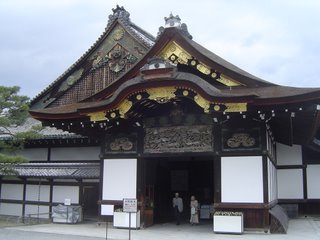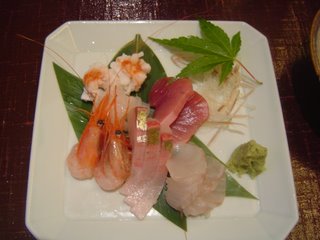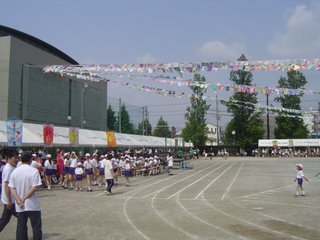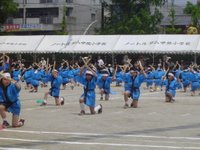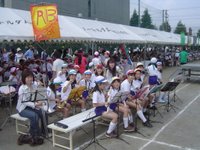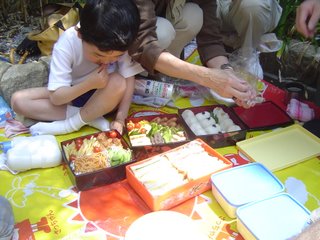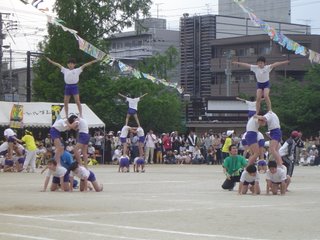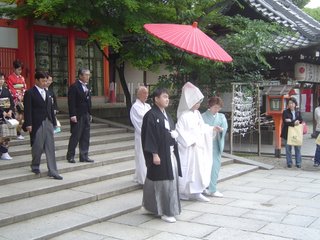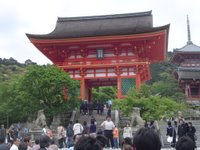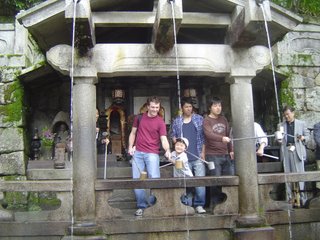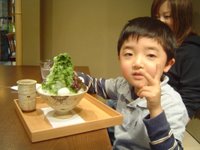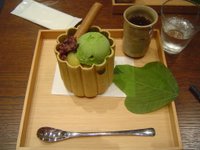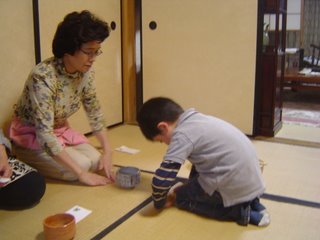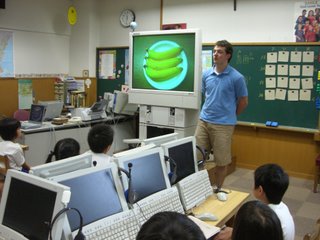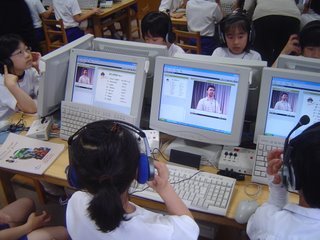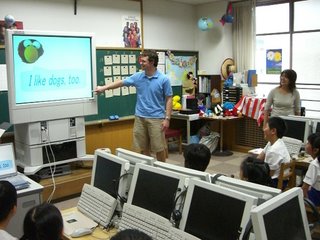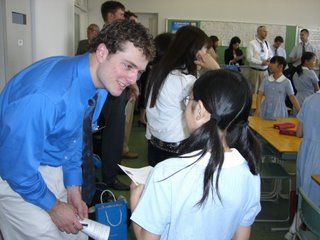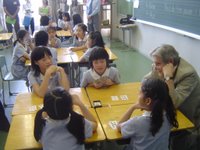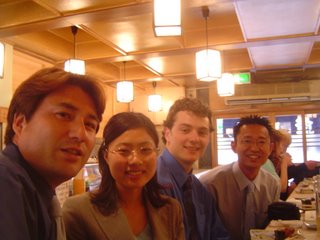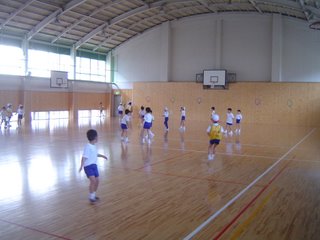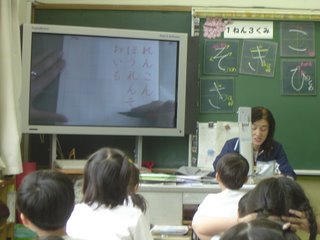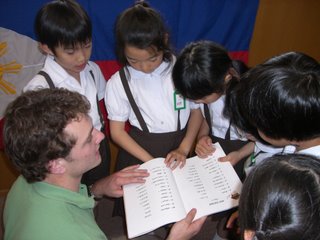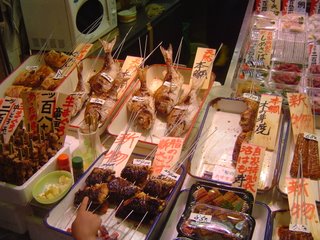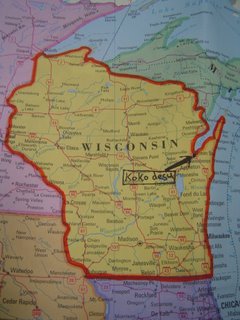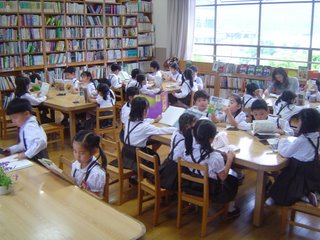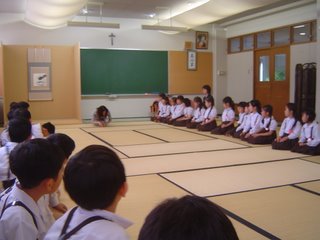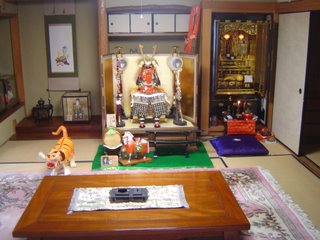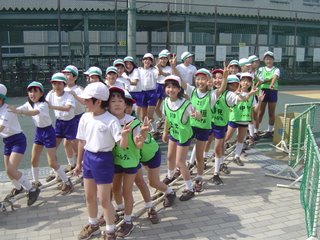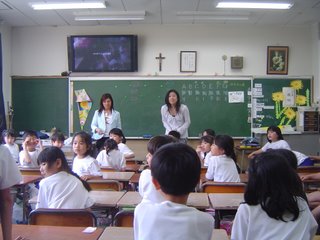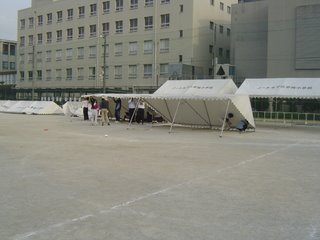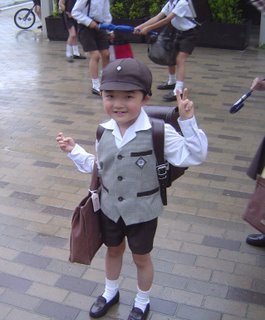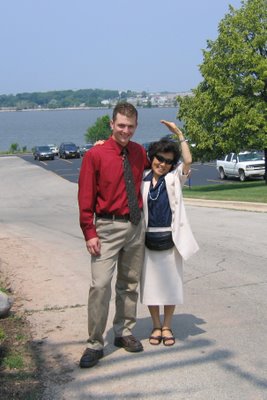Day 9: Welcome Ceremony Day
 Today was the first chance the school had to hold a welcome ceremony for me and one of the other student teachers. The first thing in the morning I went to my room in the convent and put on my double-breasted suit for the event. I wrote a few things I knew I wanted to say down on a Post-It note. I thanked everyone for their warm welcome and kind treatment and I praised the school for its great students and teachers. I explained how each day here is full of surprises and new experiences for me and I am thankful for that. Next, I expressed my desire to teach about America and the schools there, stressing that all the teachers need to do is ask me and I will be there to help out. One of the teachers had to translate all of this, but I still think I got my messages across. The second graders performed a dance and then everyone sang a couple beautiful songs. It was really neat watching all of the students sing as I sat on the stage. The first thing I did after the ceremony was run up to my room to change out of my suit; today was a hot and very humid day. Unfortunately, the humidity today is nothing compared to what it will be in a couple of weeks when the rainy season begins.
Today was the first chance the school had to hold a welcome ceremony for me and one of the other student teachers. The first thing in the morning I went to my room in the convent and put on my double-breasted suit for the event. I wrote a few things I knew I wanted to say down on a Post-It note. I thanked everyone for their warm welcome and kind treatment and I praised the school for its great students and teachers. I explained how each day here is full of surprises and new experiences for me and I am thankful for that. Next, I expressed my desire to teach about America and the schools there, stressing that all the teachers need to do is ask me and I will be there to help out. One of the teachers had to translate all of this, but I still think I got my messages across. The second graders performed a dance and then everyone sang a couple beautiful songs. It was really neat watching all of the students sing as I sat on the stage. The first thing I did after the ceremony was run up to my room to change out of my suit; today was a hot and very humid day. Unfortunately, the humidity today is nothing compared to what it will be in a couple of weeks when the rainy season begins. Yukari, Shimizu Sensei, had planned for me to be with her class this morning, but decided it would be best for me to go with the fourth, fifth and sixth grade students. The upper grades went to the nearby Kyoto Botanical Gardens. I walked with Mr. Yukita and the students for the three or four block journey. Mr. Yukita shared his philosophy regarding the position of the teacher while speaking to the students. The classes here are all about forty students, so it is important to take extra care in making sure you are visible to the students and they can hear what you are saying. I can see his point, but I am struggling with my own beliefs, given the American philosophy which holds that teachers should be moving around the class when speaking. I think both approaches have their advantages, so perhaps a combination of the two methods is the best way.
Yukari, Shimizu Sensei, had planned for me to be with her class this morning, but decided it would be best for me to go with the fourth, fifth and sixth grade students. The upper grades went to the nearby Kyoto Botanical Gardens. I walked with Mr. Yukita and the students for the three or four block journey. Mr. Yukita shared his philosophy regarding the position of the teacher while speaking to the students. The classes here are all about forty students, so it is important to take extra care in making sure you are visible to the students and they can hear what you are saying. I can see his point, but I am struggling with my own beliefs, given the American philosophy which holds that teachers should be moving around the class when speaking. I think both approaches have their advantages, so perhaps a combination of the two methods is the best way.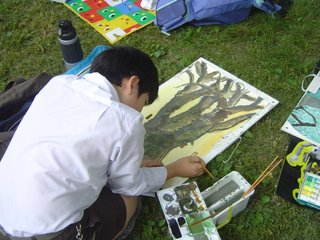
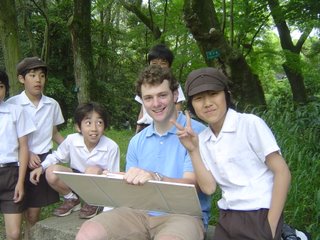 At the botanical gardens the students had to draw trees and flowers they could see. Then, the students used water-colored paints to finish their masterpieces. I took some pictures as I checked up on students throughout the gardens. I took about thirty minutes to sit with some kids and sketch my own trees. It is good thing they are easily impressed, because I am not the best artist.
At the botanical gardens the students had to draw trees and flowers they could see. Then, the students used water-colored paints to finish their masterpieces. I took some pictures as I checked up on students throughout the gardens. I took about thirty minutes to sit with some kids and sketch my own trees. It is good thing they are easily impressed, because I am not the best artist.I returned to the school to have lunch with Yukari Shimizu's class. Every table wanted me to sit with them, so it was hard to choose. After lunch I joined Mr. Matsura's class for the afternoon. The students will be taking a trip on the subway soon, so we practiced reading and writing phrases common to the subway system. We discussed manners, how people should behave, when using the subway. Mr. Matsura played safety and instructional video about riding subways. All of the material was new to me because we don't really use subways in Wisconsin.
At the end of the school day I returned to Ms. Shimizu's class for final prayer. The students can leave immediately after school or they can stay until 4:00pm. This makes the students who stay the teacher's responsibility. I played tag with the 3rd graders until 4:00pm, and by then I was quite tired.
Tonight was the scheduled night to have dinner with Mr. Yukita and his family. After school we drove to a couple grocery stores to buy the beef, vegetables, and beer for dinner. Mr. Yukita thinks that his house is as thin as a pencil, but it is not a bad place. Their home is smaller than the Hotta's, but more like the homes of typical Japanese people. Mr. Yukita has two daughters and a cute three-year-old son. We cooked the food sukiyaki-style right on the table. I was stuffed after eating the huge steak that Mr. Yukita bought for me. On the way home we stopped to sing a couple songs at a karaoke house. Mr. Yukita's daughters sang a children's song about elephants, which was quite funny. It was nice to check out a karaoke house in Japan, since they are so popular here.
Back at the Hotta's, Junpei, his mother, and I tried some origami from a book I brought with me. I tried to make a swan, but it was much to difficult. Yuko (Mrs. Hotta) made several origami animals purely from memory, proving how much origami is a part of the culture in Japan.

